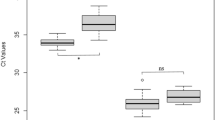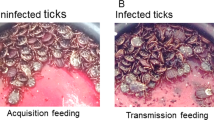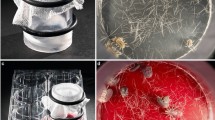Abstract
THE presence of an arsenic-resistant tick, a strain of the one-host blue tick, Boophilus decoloratus Koch, was first suspected in the East London district of South Africa in 1938. Proof of this was furnished by Omer-Cooper and Whitnall1 in 1945. It now appears that this same strain of tick has also developed a resistance to Î-benzene hexachlorido (B.H.C.).
This is a preview of subscription content, access via your institution
Access options
Subscribe to this journal
Receive 51 print issues and online access
$199.00 per year
only $3.90 per issue
Buy this article
- Purchase on Springer Link
- Instant access to full article PDF
Prices may be subject to local taxes which are calculated during checkout
Similar content being viewed by others
References
Omer-Cooper, J., and Whitnall, A. B. M., Nature, 156, 450 (1945).
Whitnall, A. B. M., and Bradford, B., Bull. Ent. Res., 38, 353 (1947).
Whitnall, A. B. M., and Bradford, B., Bull. Ent. Res. (in the press).
Author information
Authors and Affiliations
Rights and permissions
About this article
Cite this article
WHITNALL, A., THORBURN, J., WHITEHEAD, G. et al. A Tick Resistant to Î-Benzene Hexachloride. Nature 164, 956–957 (1949). https://doi.org/10.1038/164956a0
Issue Date:
DOI: https://doi.org/10.1038/164956a0
Comments
By submitting a comment you agree to abide by our Terms and Community Guidelines. If you find something abusive or that does not comply with our terms or guidelines please flag it as inappropriate.



